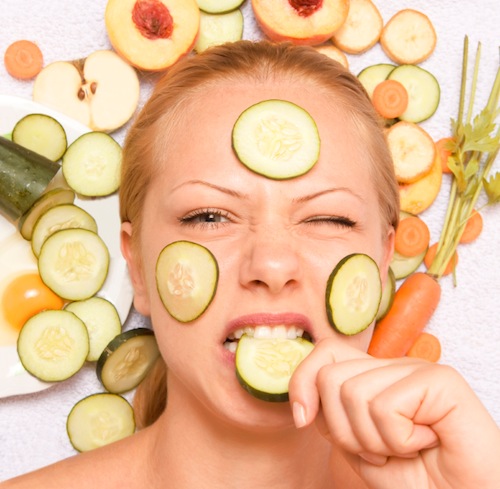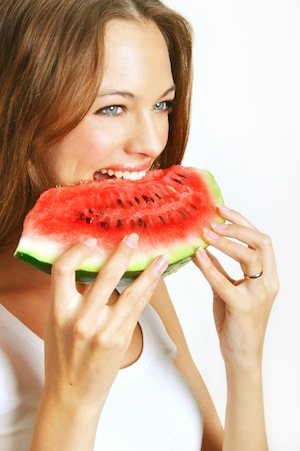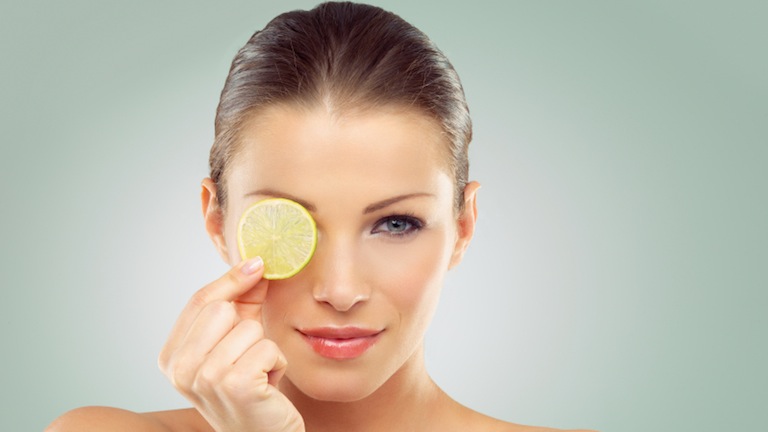Want beautiful skin? Here’s exactly you need to be eating to get that perfect glow, and what foods to avoid. Healthista speaks to top leading dermatologists to find out what food to eat in order to get beatutiful healthy skin
If you’d asked a dermatologist 20 years ago whether changing your diet could make your skin look better, they must have muttered something about ‘everyone should eat a balanced diet,’ and sent you on your merry way. Many would have dismissed the idea altogether. How times have changed.
increasingly large scientific studies are showing exactly which foods do what to skin
Not only are skin specialists now convinced of the link between what we eat, and the look and feel of our skin – from acne to wrinkles, to sagging and even the skin’s own sun-protection – increasingly large scientific studies are also showing exactly which foods do what to skin.

but also hyper-pigmentation and acne
Hearteningly, this means that depressing old aged: ‘it’s in the genes’ isn’t the whole story, and there is plenty you can do to influence the state of your face. ‘Only 20 percent of the way you age is down to genetic factors,’ says leading celebrity dermatologist Dr Neetu Nirdosh, whose client list includes Kelly Brook and Frieda Pinto. ‘The other 80 per cent is governed by lifestyle factors such as smoking and sun damage. A large part of that is diet, which can affect not only wrinkles and fine lines, but also hyper-pigmentation and acne’.
MORE: 6 common skin problems and the best creams to fix them
What not to eat
It’s never too early to adopt a skin healthy diet geared towards anti-ageing, says Dr Stefanie Williams, dermatologist and founder of eudelo.com. In fact, a study published in the British Journal of Dermatology found that ageing effects the skin – think collagen breakdown and skin thinning – typically begin around 35.
the higher the amount of sugar and high GI carbs a person ate, the older they look
‘A diet high in sugar and high-glycemic index (GI) carbohydrates such as white rice, pasta, bread, and sweets hove now been shown to cause inflammation in the body that can make the skin age much quicker,’ says Dr Williams. Staggeringly, in May last year, a study from the Leiden University Medical Centre in the Netherlands made the first direct link between the amount of sugar circulating in the blood, and how old a person looks. It found the higher the amount of sugar and high GI carbs a person ate, the older they looked.

Here’s what’s happening. When blood sugar levels are constantly on the high-low cycle that comes from a high sugar and high carb diet, (eating too often between meals has the same effect), sugar molecules permanently bond to proteins, including the collagen in your skin. This is a process known as glycation, and produces aptly named compounds called AGES, or Advanced Glycation End products (AGEs), that cross-link with proteins, says Dr Williams. ‘Consequently, tissues become stiff and inflexible, skin becomes tougher, saggier, and wrinkles form often prematurely,’ she explains.
When blood sugar levels are constantly on the high-low cycle that comes from a high sugar and high carb diet, sugar molecules permanently bond to proteins, including the collagen in your skin.
A diet high in dairy may elevate hormone levels and contribute to acne, says leading London dermatologist Professor Nicholas Lowe. ‘Where once we as dermatologists dismissed the idea of diet and pimples, there is now good evidence of a link between unrefined sugars, sweets, milk chocolate, and unrefined carbohydrates with increased incidence of acne breakout,’ he says. When he puts patients with inflammatory skin conditions, such as acne, psoriasis, and eczema, on diets reducing their intake of refined sugars and dairy products, Dr Lowe explains, their conditions often get better. ‘Changing their diets can deduce the severity of their conditions,’ he says.
MORE: Eating for a healthy heart: 13 essential nutrients you need
Feed your face
Sticking to low-GI diet (check glycemicindex.com and stick to foods with a GI of 50 or under) and avoiding sugary foods will help your skin. But if you want to keep blood sugar levels stable, and reduce breakouts and / or help early ageing in the skin, Dr Williams suggests – perhaps controversially – avoiding all starchy, grain-based foods, even the brown versions, in favour of lean proteins such as beef, lamb, chicken, fish, and plenty of vegetables. ‘Avoid sweet tropical fruits and have fresh fruit in moderation,’ she says. ‘Except all types of berries. They’re high in antioxidants that bring great anti-ageing benefits to the skin.’
Your low-fat diet could be sabotaging your face, says Dr Nirdosh. ‘You might get someone that is really think, and is eating a lean, low-fat diet, and drinking plenty of water, but their skin may look dry, dehydrated, and with a certain grey colour, she explains. ‘That’s dehydration because they don’t have enough good fat content in their diets which means the skin is unable to retain its water, and more moisture is evaporating from its surface, especially in air-conditioned, or heated environments.’ She suggests opting for good fats such as coconut oil for cooking, nuts such as almonds, Brazils and walnuts, avocadoes and oily fish. ‘These contain essential lipids that create a protective surface around the skin cells and prevent essential water within the, from escaping,’ says Dr Nirdosh.
dry skin is due to a lack of good fat content in diet, which means the skin is unable to retain its water, and more moisture is evaporating from its surface

in water more efficiently rebalance the water
in your system
Likewise, skin legend Dr Howard Murad, founder of Murad skincare and associate professor of medicine at UCLA says damaged skin cells have a weakened ability to retain water, so skin loses elasticity, tone, and surface moisture. ‘Puffy eyes, swollen ankles, and even a bloated stomach are also signs the body isn’t handling water efficiently,’ he says. ‘It also explains some of the early signs of ageing that might occur in your early 30s, particularly skin becoming drier and feathery lines emerging.’ But he too agrees that guzzling water won’t solve the problem. ‘Consuming fruits and vegetables that are high in water more efficiently rebalances the water in your system because these foods are surrounded by molecules that help deliver the water they contain into cells more easily,’ says Dr Murad. ‘For this reason I encourage patients to eat – not drink – their water.’ Foods highest in water content include, watermelon and cucumbers that are 97 per cent water, broccoli, and spinach (92 per cent), apricots (86 per cent), pomegranates (82 per cent) and avocados (82 per cent).
Fascinatingly, scientists at Manchester University have even found that certain foods can increase the natural sun protection in your skin. ‘When tomatoes and the foods made from them such as salsa and ketchup are consumed regularly, patients’ skin can over time become less susceptible to sun burn,’ explains Dr Tamara Griffiths, trustee of the British Skin Foundation. ‘This is thanks to the lycopene content in tomatoes which appears to have the skin-protective benefits,’ says Dr Griffiths.
When tomatoes and the foods made from them, such as salsa and ketchup, are consumed regularly, patients’ skin can over time become less susceptible to sun burn
Some also believe that compounds called flavonoids in citrus foods, green tea and pomegranate and another called resveratrol found in red grapes (and happily, red wine) could have the same effect. ‘Of course, this isn’t in place of a sunscreen but it may help the skin’s own protection in areas sunscreens don’t reach,’ says Dr Griffiths. So, is there a diet out there that beats others hands down in skin-friendly treasures that is do-able enough for the rest of us to stick to? ‘Probably the Mediterranean diet,’ she says. ‘Overall, it’s high proportion of omega-3 rich fish and it’s naturally occurring antioxidants in all the different coloured vegetables it emphasizes is probably the best – and most realistic – healthy diet for skin.’
MORE: 7 secret reasons your skin pigmentation changes colour
WHAT DERMATOLOGISTS (WITH GREAT SKIN) REALLY EAT
These dermatologists not only know what makes skin tick, they practice the skin-friendly eating they wax lyrical about. Believe us, their methods work (we have seen them all in person, up-close)
DR NICK LOWE
I swear by: Boiled eggs, tomatoes, oily fish (salmon, herring, sardines) and plenty of green vegetables along with red meat twice a week.
I don’t touch: I have rosacea which causes redness and broken capillaries so I avoid foods that aggravate such as alcohol, over-spicy curries and hot drinks, I have taught myself to enjoy tea and coffee cold!
DR NEETU NIRDOSH
I swear by: Freshly squeezed tomato juice made with 5-6 fresh tomatoes at breakfast, fresh beetroot, watermelon, Brazil and walnuts, brown rice, carrots, chicken, eggs, fresh fish and meat such as lamb and many vegetables. Oysters are so high in skin-loving zinc they could practically be a skin medicine, eggs and liver are high too.
I don’t touch: Sugar, coffee (I have decaf or green tea), refined carbs, eating between meals (it causes too many skin-unfriendly insulin spikes) or eating after 7pm as the body needs to release anti-aging hormones for repair at night and eating too late causes it to release insulin which negatively affects skin.
DR STEFANIE WILLIAMS
I swear by: All types of berries, fish, meat, eggs and fruits and vegetables eaten together in the widest variety of colours I can manage at any one time as you need to eat all the different types of antioxidants they contain ideally in combination for maximum skin benefit. 85 per cent cocoa chocolate, coconut and almond flour for baking and 100 per cent birch-wood derived Xylitol (£9.99 on Amazon) for sweetening (studies have shown induces collagen production in the skin.
I don’t touch: Sugary, fried or processed foods, starches and all types of grains.
DR SAM BUNTING
I swear by: Slow-release carbs such as wholemeal bread, brown rice, lentils and pulses as I have a tendency to break out if I am stressed. Sashimi, almonds, green leafy vegetables green tea. Each day I have a shake made with a handful each of blueberries, raspberries and some pomegranate with a banana, some coconut water and a spoonful of Linwood’s Goji berries and flaxseeds crushed (£5.99 on Amazon). It’s my breakfast skin fix.
I don’t touch: White carbs, anything high salt, or desserts.
DR MICHAEL PRAGER
I swear by: The Mediterranean diet (my wife is Greek Cypriot which helps), sprouted lentils, chickpeas and beans, groceries from Riverford Organic, wild Atlantic salmon and line caught fish. Lots of organic nuts. Salads. 80 pre cent cocoa chocolatepreferably from Ottolenghi. Eye bread. Green and Darjeeling tea. Buckwheat or spelt pasta.
I don’t touch: Wheat, red meat or too much sugar.
Like this article? Sign up to our newsletter to get more articles like this delivered straight to your inbox.


























































